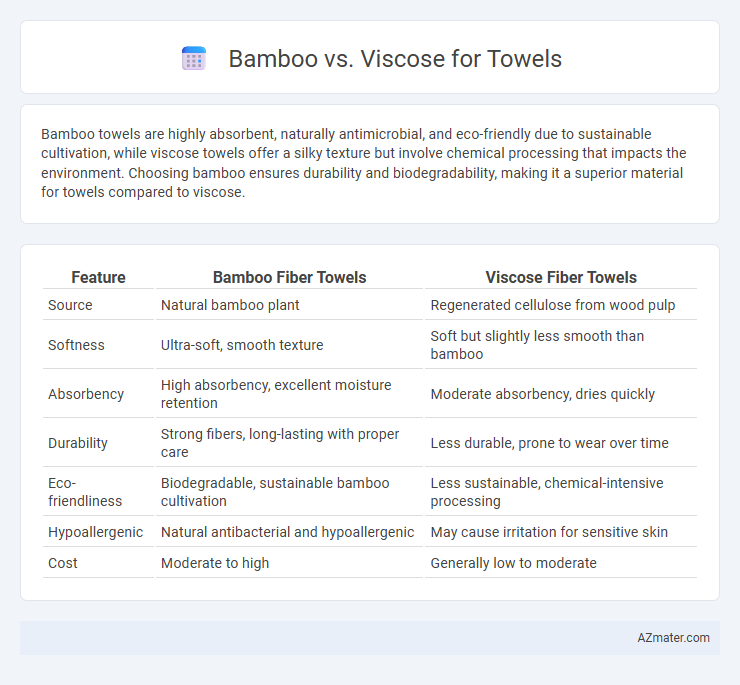Bamboo towels are highly absorbent, naturally antimicrobial, and eco-friendly due to sustainable cultivation, while viscose towels offer a silky texture but involve chemical processing that impacts the environment. Choosing bamboo ensures durability and biodegradability, making it a superior material for towels compared to viscose.
Table of Comparison
| Feature | Bamboo Fiber Towels | Viscose Fiber Towels |
|---|---|---|
| Source | Natural bamboo plant | Regenerated cellulose from wood pulp |
| Softness | Ultra-soft, smooth texture | Soft but slightly less smooth than bamboo |
| Absorbency | High absorbency, excellent moisture retention | Moderate absorbency, dries quickly |
| Durability | Strong fibers, long-lasting with proper care | Less durable, prone to wear over time |
| Eco-friendliness | Biodegradable, sustainable bamboo cultivation | Less sustainable, chemical-intensive processing |
| Hypoallergenic | Natural antibacterial and hypoallergenic | May cause irritation for sensitive skin |
| Cost | Moderate to high | Generally low to moderate |
Introduction to Bamboo and Viscose Towels
Bamboo towels are crafted from natural bamboo fibers known for their antibacterial properties and exceptional absorbency, making them ideal for sensitive skin and quick drying. Viscose towels, derived from cellulose regenerated from wood pulp, offer a smooth, silky texture and high moisture-wicking capability but may lack the natural antimicrobial benefits of bamboo. Both materials provide eco-friendly alternatives to conventional cotton towels, with bamboo emphasizing sustainability and softness while viscose focuses on luxury and durability.
Understanding Bamboo Fiber Composition
Bamboo fiber used in towels primarily derives from the cellulose in bamboo plants, transformed through either mechanical or chemical processes into viscose or lyocell fibers. Unlike pure viscose, which often originates from wood pulp, bamboo viscose retains some natural antimicrobial and moisture-wicking properties intrinsic to bamboo cellulose. Understanding the fiber composition highlights bamboo towels' potential for softness, breathability, and environmental benefits compared to conventional viscose towels.
What Is Viscose and How Is It Made?
Viscose is a semi-synthetic fiber derived from cellulose, primarily sourced from wood pulp, including bamboo and other plants. The manufacturing process involves chemically treating the cellulose with sodium hydroxide and carbon disulfide to create a viscous solution, which is then spun into fibers. This transformation results in a soft, absorbent material commonly used in towels for its smooth texture and moisture-wicking properties.
Environmental Impact: Bamboo vs Viscose
Bamboo towels are often marketed as eco-friendly due to bamboo's rapid growth and minimal pesticide requirements, yet the environmental impact depends significantly on the processing method, with traditional viscose production involving chemically intensive processes that can cause pollution. Viscose derived from bamboo fibers typically undergoes a similar viscose-rayon conversion, which uses toxic solvents such as carbon disulfide, leading to water and air contamination, whereas more sustainable alternatives like closed-loop lyocell technologies reduce harmful emissions. Life cycle assessments show that sustainably harvested bamboo with closed-loop processing methods results in lower carbon footprints and decreased environmental harm compared to conventional viscose towels produced from wood pulp or bamboo.
Softness and Comfort Comparison
Bamboo towels are renowned for their exceptional softness due to the natural fibers' smooth texture that mimics silk, providing superior comfort on sensitive skin. Viscose towels, made from chemically processed wood pulp, also offer a soft feel but lack the natural breathability and hypoallergenic properties found in bamboo. The moisture-wicking ability of bamboo fibers enhances comfort by keeping the skin dry and fresh, making bamboo towels a preferred choice for those seeking luxury and durability.
Absorbency and Drying Efficiency
Bamboo towels exhibit superior absorbency due to their natural micro-gaps and micro-holes, enabling them to soak up water quickly and hold more moisture compared to viscose. Viscose towels, derived from cellulose fibers, also offer good absorbency but tend to retain moisture longer, resulting in slower drying times. Bamboo fabric's antimicrobial properties combined with its enhanced drying efficiency make it a preferred choice for towels requiring quick moisture wicking and freshness retention.
Durability and Lifespan Differences
Bamboo towels offer superior durability due to their natural fiber strength and antimicrobial properties, resulting in a longer lifespan compared to viscose towels. Viscose, derived from wood pulp, tends to weaken faster with frequent washing, leading to quicker wear and tear. Bamboo fibers maintain their integrity over time, making them a more resilient choice for towels subjected to regular use.
Allergy-Friendly and Hypoallergenic Properties
Bamboo towels are naturally hypoallergenic and resistant to dust mites, making them an excellent choice for allergy sufferers and sensitive skin. Viscose towels, while soft and absorbent, may contain chemical residues from the manufacturing process that can trigger skin irritation or allergic reactions. Choosing bamboo towels offers superior allergy-friendly benefits due to their antimicrobial properties and minimal processing.
Care and Maintenance Guidelines
Bamboo towels require gentle washing with cold water and mild detergent to maintain their softness and durability, avoiding bleach and fabric softeners to prevent fiber damage. Viscose towels need careful handling due to their delicate fibers, typically washed in cold water on a gentle cycle, and should be air-dried to prevent shrinkage and maintain absorbency. Both materials benefit from avoiding high heat in dryers and ironing, ensuring longevity and optimal towel performance.
Which Is Better: Bamboo or Viscose Towels?
Bamboo towels offer superior antibacterial properties, natural moisture-wicking, and enhanced softness compared to viscose towels, making them more hygienic and comfortable for everyday use. Viscose towels, derived from chemically processed wood pulp, tend to lack the durability and eco-friendliness of bamboo fibers. Choosing bamboo towels ensures better absorbency, longer lifespan, and a more sustainable fabric choice for an optimal towel experience.

Infographic: Bamboo vs Viscose for Towel
 azmater.com
azmater.com